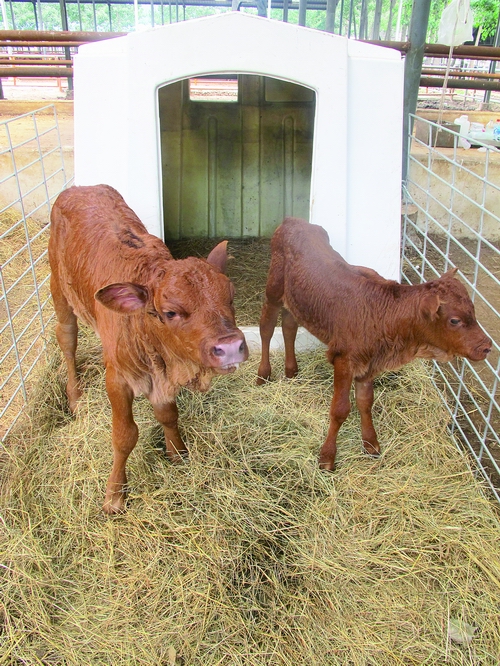GM calves bred to beef up flavor

Scientists in Beijing confirmed they have successfully bred two genetically modified (GM) cloned calves for the first time in the capital Tuesday.
The calves are both healthy, professor Ni Minhong, the lead researcher on the GM cattle cloning project, told the Global Times Tuesday.
Both were born at the Comprehensive Experimental Base of Beijing University of Agriculture in Daxing district, one on July 19, and one on August 1, he said.
While the ultimate aim is to market the meat to consumers, there will still be considerable obstacles in terms of cost, health issues and also public opinion, experts in the field told the Global Times.
According to Ni, 200 female cattle were chosen from a pasture in Daxing district last year and were implanted with modified embryos.
"Seven of them became pregnant, but two of the seven cows miscarried. These two babies were the only ones born alive," he said.
The two female calves, named Jing Qin No.1 and No.2, are the first GM cloned cattle whose meat contains adipocyte fatty acid binding protein, leading to higher levels of protein, which will improve the taste of the meat, said Ni.
"The program was originally started in 2009 but until these two calves were born, we experienced many failures," Ni said.
He refused to talk in too much detail about this experiment, saying it is still controversial.
"People are skeptical," he said, "but all we can say is the technology has actually reached a mature stage."
The two calves will take around 26 months to become fully mature, but it would take at least three years before people would be able to buy such GM beef, the Beijing Evening News reported Tuesday.
So far, the money spent on the milk used for feeding the calves is around 7,000 yuan ($1101.1), the Beijing News reported.
Fang Lifeng, Food and Agriculture campaigner from Greenpeace, said that as far he knows, no GM beef has been manufactured commercially.
"The current research concerning the safety of GM food is immature, so it's too early to introduce it to the commercial food chain," said Fang.
Fang alleged that the reason why many institutes are keen on GM product research is partially because of commercial interests.
"Given the GM crops that are more scientifically mature than the meat, but which are still controversial in terms of their possible affects on the human body, it will take at least a decade to prove GM beef is safe before it can be sold commercially," Fang noted.
Gao Dong, the deputy party secretary of Beijing University of Agriculture, said that their purpose is to market the GM beef.
"This program aims to escalate the quality as well as the productivity of domestically produced beef," Gao said.
She noted that in terms of their current tests on the calves, the quality of the beef should be better than any other domestically produced beef.
Yao Qingxiao, assistant director of the Institute of Genetics and Developmental Biology at the Chinese Academy of Sciences, said that although GM cattle are a fact, the research is still at an experimental level.
"Besides, the core purpose of scientific research should be for investigation, not marketing," said Yao.
A local resident surnamed Wu, who works in media, said that although she knows a lot of cooking oil is made from GM beans now, she has concerns over whether GM beef would have adverse health effects.
"Price, health, and taste are the three elements I might put into consideration," she said, "but ultimately health is the main priority above all."
In April, scientists from the Inner Mongolia Agricultural University in the Inner Mongolia Autonomous Region, announced they had successfully bred three GM calves.
Zhou Huanmin, one of the scientists involved, told the Global Times that their experiment is for commercial reasons to produce higher volumes of more nutritious milk.
The team has not announced the results of this program so far.